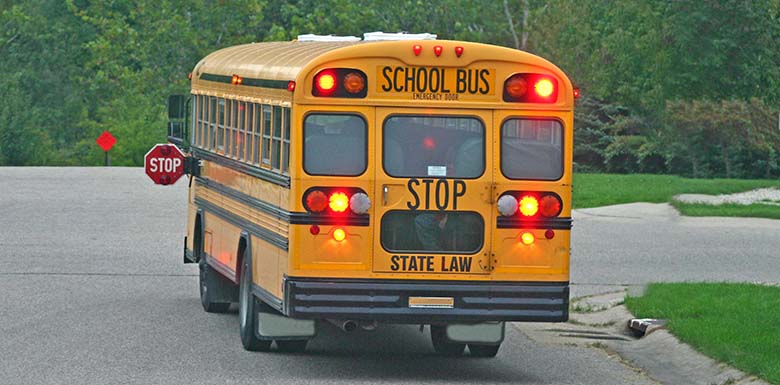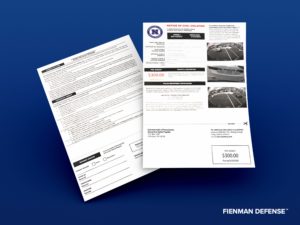Pennsylvania’s New School Bus Law – We’re Not Any Safer & It Looks like a Money Grab
Jan 31 2023, by in Legal Blog, Traffic Defense
You’ve probably seen news reports about a new school bus passing law in school districts across the Commonwealth. And while it is touted as a significant public safety effort, critics point to the potential for abuse, some calling it a ploy to line the pockets of corporate interests.
The Problem with PA’s School Bus Passing Law
Under the new school bus passing law, schools are now allowed to equip buses with stop-arm cameras to detect drivers who fail to stop when directed to do so. Since being implemented, the cameras are already reaping big rewards for districts throughout the state.
On its surface, the law is meant to keep children safer. But does it actually do more than previous solutions and existing laws about passing a school bus when the red lights flash?
The only difference now appears to be that various private entities benefit. At its worst, the new school bus law may violate the civil liberties of Pennsylvania’s citizens.
Where Did the New Law Come From?
Sen. Camera Bartolotta (R-46) helped implement the new law, which was supposed to be easier to enforce than the former School Bus Passing Law. In the past, bus drivers and the police had to act quickly to collect information when a driver failed to stop for a school bus.
Under the new law, school districts can put cameras on buses’ stop arms. Those cameras will automatically capture license information if a driver fails to stop when a bus has its red lights on. What they fail to capture is the identification of the driver.
The goal of the new law is valid. Lawmakers want to prevent tragedy at bus stops. However, at what cost, and does it even do any good?
In practice, civil citations are issued to motor vehicle owners who may not have been the actual drivers operating the vehicle when the bus was passed. Then, those individuals are forced to affirmatively defend themselves.
We’ve seen this play out in other scenarios where local governments try to automate traffic enforcement, such as using red light cameras. But issuing citations without identifying the driver is almost never effective and routinely amounts to a way to fill local coffers.
How Ticketing Works Under the New Law
The law lets school districts issue a civil citation directly to the motor vehicle’s owner, identified through the car’s license plate.
Here’s an example of a citation someone may receive:

A private agency like BusPatrol will send correspondence to the alleged offender, and if left unpaid, private collection agencies will likely attempt to take money from the individual. While the public school district ultimately benefits, so do many private organizations.
This differs greatly from when a police officer would issue a citation to an individual who failed to stop for a bus. The government handled the entire process in those situations, and the citation was validly issued.
Some may suggest that removing an overburdened government from enforcing school bus traffic violations is a good thing. However, isn’t a police force accountable to the public better suited for such an essential function rather than a private business with a vested interest in sending out as many citations as possible?
After all, more citations mean more fines, more collections, and ultimately higher profits for the companies that administer the program for the districts. But when incidents of inappropriately passing a school bus are reduced, the community gets safer.
Will I Get Another Ticket for Passing a School Bus?
When violations are recorded, they are supposed to be first forwarded to the police for review. If the offense is deemed egregious, then you may receive a “normal” traffic ticket for illegally passing a school bus, which is punished with $250 fine, 5 points on your driving record, and an automatic 60-day suspension of your driving privileges upon conviction.
If you receive such a violation, your case will progress like any other traffic offense, but you should not receive a civil violation.
However, the practice is new, and mistakes are bound to happen. While the civil violation could be an example of government overreach it is relatively safe to assume that if you received a school bus video ticket, you will not receive an additional ticket because the local police should have reviewed the video by that point.
How Do PA Courts Handle School Bus Tickets?
Unsurprisingly, the Pennsylvania courts are having difficulty addressing these civil citations, which is a serious problem. To better address people’s unique issues, here are the most up-to-date court rules available (Effective April 2023) regarding the scope of the new school bus passing law and hearing requests.
Is the Law Constitutional?
The new law likely violates citizens’ state constitutional rights. Citing registered owners for their vehicle that was videotaped driving by buses may violate civil liberties. The problem is that someone will need to challenge the law, which can be costly compared to the fine.
Will The Law Actually Solve Anything?
It’s unlikely this new law will solve the problem lawmakers are trying to address. Those cars that speed around stopped buses will continue to violate the law and put children at risk.
At the same time, the law will cause problems by mixing public and private interests where private entities benefit from a public program.
Where Does the Money Go?
This law is generates income for schools when they issue civil citations and collect money from people who allegedly violate the law. However, those benefiting are the private entities that the schools have tasked with carrying out the process.
The schools must purchase stop-arm cameras and pay for maintenance. They must hire companies to manage the systems, review video footage, issue civil citations, collect money from individuals, and more. How many of the companies were also involved in the lobbying process to get the law passed?
The entire situation is questionable at best.
What Can Be Done About the Law?
Anyone who is issued a civil citation can challenge it in court. Since there are so many legal issues with these citations, most people stand a good chance of seeing a dismissal. But again, this would be a process outside of paying the allotted fine to make the matter go away.
Someone will ultimately have to challenge the law in court. The private organizations that are benefitting will likely fight back. School districts may not help as much as they anticipate because much of the income generated likely goes the private organizations to equip buses with cameras, maintain the equipment and administer the issuance/collection of the civil fines.
School districts may be on board to make changes once they realize the true cost of the program.
Pennsylvania Citizens Still Have Rights
It’s admirable to want to keep children safe when getting on and off school buses but using that desire to justify a violation of your rights is not the way to do it. Understandably, lawmakers and their constituents want to find a way to protect children.
Still, ticketing people without the ability to establish identification of the driver drastically increases the risk of financial abuse and does not produce the desired outcome.
For all these reasons, the new school bus passing law should be challenged.
Attorney Michael H. Fienman represents clients in criminal and traffic matters across Philadelphia, Montgomery, Bucks, Delaware, and Chester counties. As an experienced trial attorney, he is a zealous advocate known for relentlessly defending clients in state court, federal court, and before administrative agencies.
Attorney Fienman is licensed to practice before the Supreme Court of Pennsylvania, the Supreme Court of New Jersey, the US District Court for the District of New Jersey, and the US District Court for the Eastern District of Pennsylvania.


